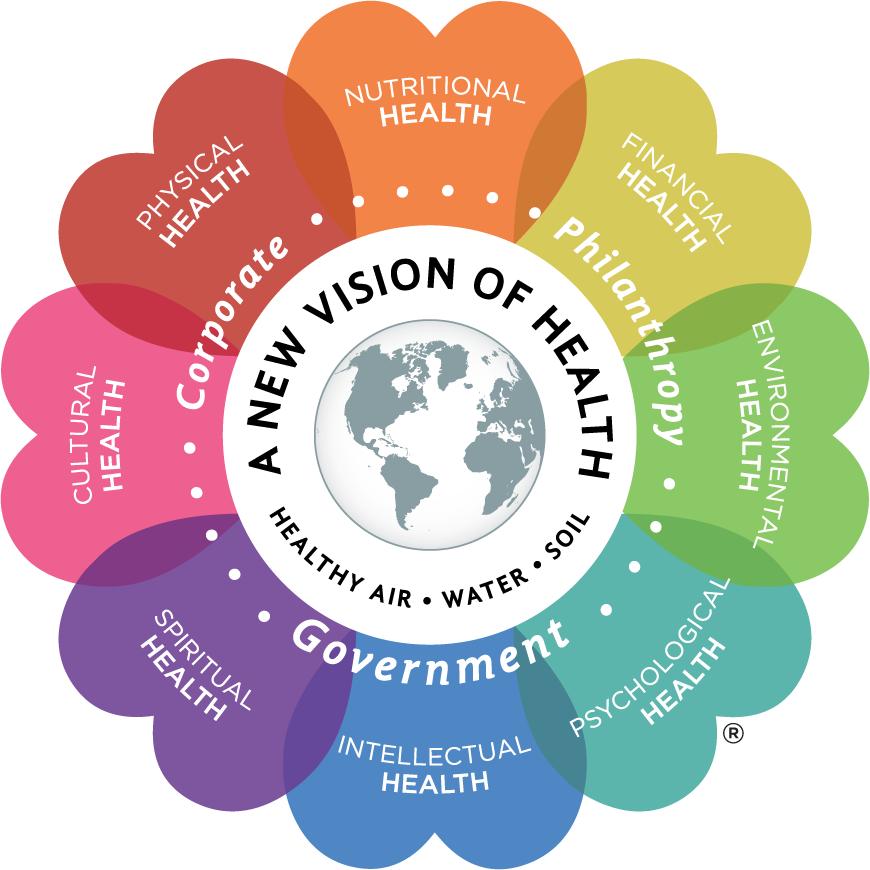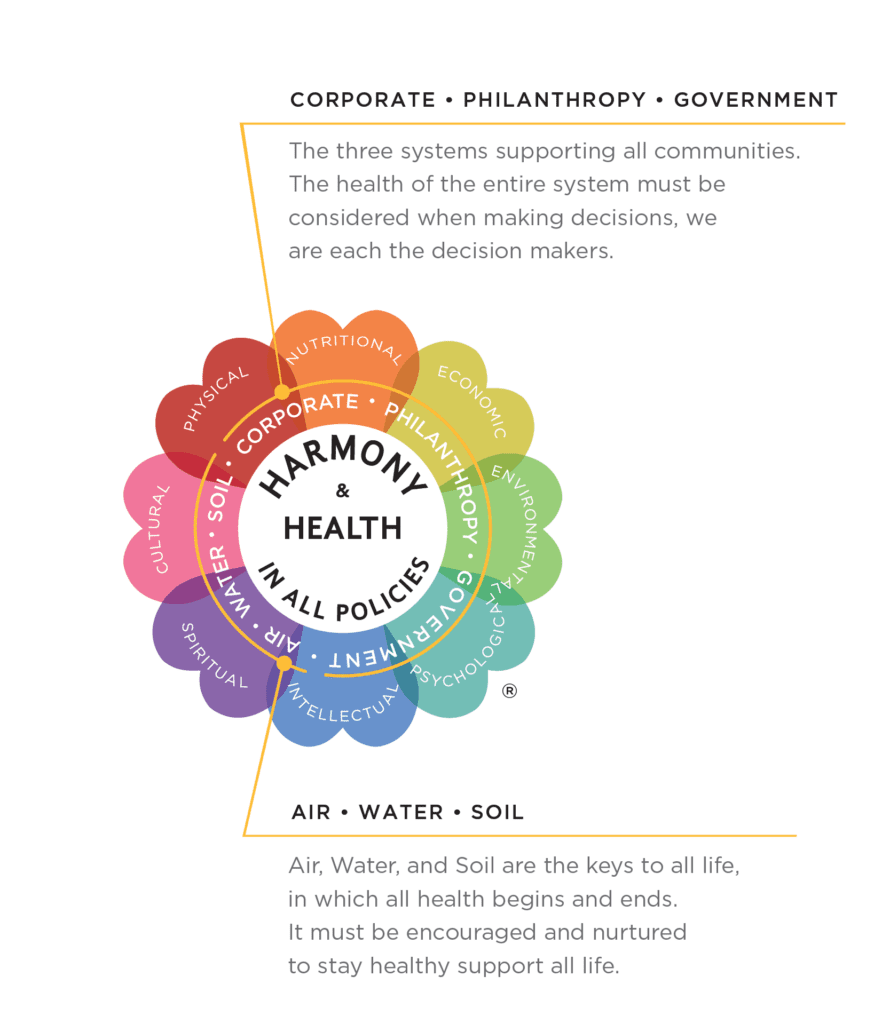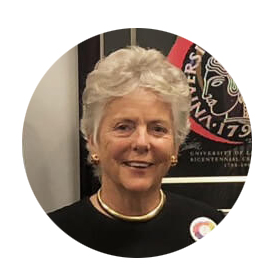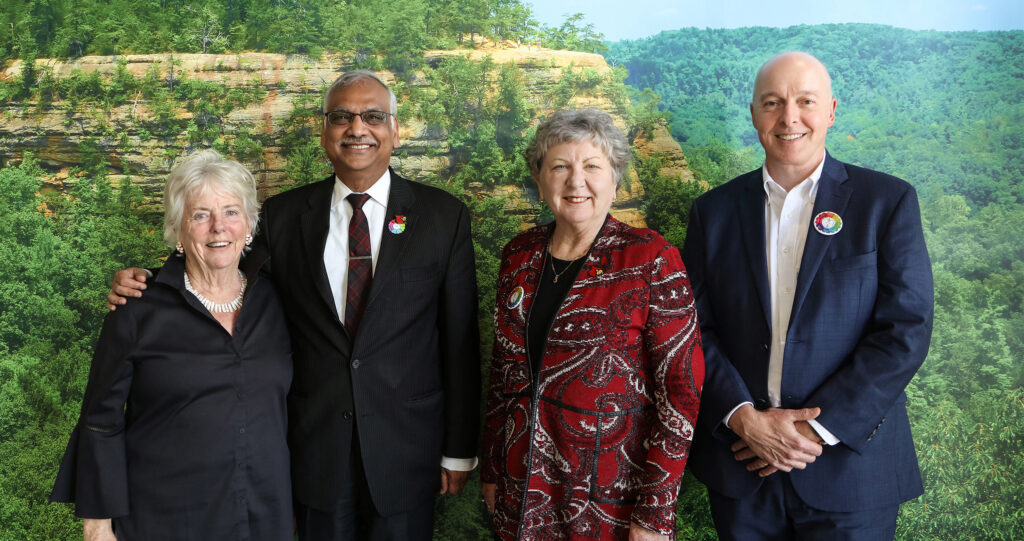A New Vision of Health
Where all decisions are made through the lens of all forms of health.

The Circle of Harmony & Health
The Circle of Harmony & Health is a tool to help guide and empower individuals and communities to live the healthiest, most-balanced life possible, and to understand the interconnection between all forms of health.
It is made up of eight parts with each heart representing an aspect of health: nutritional, economic, environmental, psychological, intellectual, spiritual, cultural, and physical. The hearts are directly connected to the others, which together make up an individual’s and a community’s holistic health. At the heart of the Circle, you’ll find healthy air, water, and soil. Access to those three basic elements are the critical foundation to our communal health. The systems supporting any community – Corporations, Philanthropy, and Government – must consider the health of the entire system in order to make healthy decisions.
We all share this miraculous home. We must be part of the solutions to heal it.

A New Vision of Health
The Circle of Harmony & Health was designed as a tool to illustrate our multiple forms of health, informing human health that is derived from the natural, social, and cultural ecosystems. Our illustrative tool is representative of the circular path of nature’s own cycles, but also because it has neither beginning nor end and is therefore a suitable symbol for the constant and ongoing health process.
Become A Part of the Health & Harmony Circle
Nutritional Health
Provides foods that are nourishing and support a balanced diet. We are what we eat.
Economic Health
Allows for equal access to the marketplace.
Environmental Health
Protects natural habitats and considers the lasting impacts imposed on our surroundings and the Earth, safeguarding healthy air, water, and soil.
Psychological Health
Prioritizes mental and emotional wholeness.
Intellectual Health
Comprises a diversity of shared knowledge, a culture of curiosity, skills, and wisdom within a community.
Spiritual Health
Encompasses experiences and wisdom that nurture the human soul and spirit. Allows for space to awe in the genius of the natural world.
Cultural Health
Encapsulates the vibrancy, customs, diversity, eccentricities, arts, and traditions of a community or place. Celebrates diversity in the unity of humankind.
Physical Health
Promotes fundamental wellness of one’s body.

Christina Lee Brown
Christy Brown’s interconnected vision of health, incorporating citizen science and advocacy, inspired the foundation of The Institute for Healthy Air, Water & Soil in 2012 as well as the partnership that became the Envirome Institute in 2018. Guided by the Circle of Harmony & Health, a tool she developed, Brown’s philanthropy promotes responsible decision making “through all forms of health.” The Circle highlights interrelationships among environmental and human health, and the need to bring all forms of social and individual ecosystems into balance by considering health. She currently serves on the boards of the Sustainable Food Trust in England, The Berry Center, The Center for Interfaith Relations, The Louisville Orchestra, and The National Trust for Historic Preservation.
We Are Building Collaborations for a Healthier World & Community:

Widely regarded for spearheading the new field of Environmental Cardiology, Dr. Aruni Bhatnagar, a Smith and Lucille Gibson Professor of Medicine at the University of Louisville, has spent more than 25 years studying the impact of toxic substances, tobacco smoke constituents and environmental pollutants on heart disease. A leader in cardiovascular health, he has participated in more than 50 peer-review panels for the National Institutes of Health, published over 280 scholarly articles and 20 book chapters, served on multiple committees for the Institute of Medicine, and as the Deputy Editor for the American Heart Association’s Circulation Research. Dr. Bhatnagar currently serves as Director of the Christina Lee Brown Envirome Institute, the Diabetes and Obesity Center, and American Heart Association Tobacco Regulation and Addiction Center at the University of Louisville.
Ted Smith is an associate professor of environmental medicine and deputy director of the Envirome Institute at the University of Louisville School of Medicine. His research program is focused on how human health depends upon components of the natural environment and how this affiliation modifies cardiometabolic disease risk. Smith is also the director of the Envirome Institute’s Center for Healthy Air, Water and Soil. He previously served as chief innovation officer for the City of Louisville, where he created AIRLouisville, the largest real-time asthma surveillance research MS and PhD in experimental psychology from Miami University, and completed his post-doctoral studies at Massachusetts Institute of Technology (MIT).

